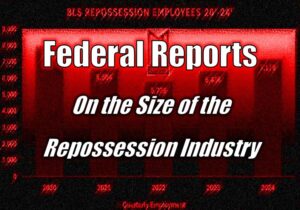
EDITORIAL
With every national disaster come relief efforts and a consistent tactic employed are moratoriums on repossessions, especially in the most affected areas. Over the last three days, at least three major lenders have put all of their repossessions on hold and the state of California has already implemented a 45-day moratorium on evictions, which leads me to wonder if all repossessions could soon be affected soon. As of midnight, tonight the entire San Francisco Bay Area was put on a shelter in place until April 7, prohibiting non-essential travel, which would obviously include repossessions. If these trends continue and expand into other states and lenders, and it likely will, most, if not all, the survival of all repossession agencies are at stake.
On March 12th, I was advised that TitleMax had placed all of their repossession assignments on hold until at least 4/1/20 and Westlake Financial soon followed suit with Wells Fargo making the same announcement on Monday. This situation is fluid and showing no signs of impending improvement based upon the most recent White House announcement that we could be affected by this through the later parts of the summer. This is, without a doubt, the most dramatic social, national and economic event of our lifetimes and will forever change the repossession and collections industries.
No surprise to our audience, most repossession companies rely on repossession activity alone for their income and obviously, a long-term moratorium on repossessions could close their companies. While the profit sucker of fuel negates some of the expenses, recurring expenses such as insurance, networks, cameras, etc., can bury a company quickly. While this is a dire possibility, it is important for everyone to get in front of this and consider relief efforts for the repossession industry should these moratoriums come into play.
I have spoken with several repossession industry service providers, who are aware of the ramifications of a repossession moratorium and have been advised that relief options are currently in consideration. They are unanimous in recognizing the long-term negative effects of a reduction in repossession agencies on their own companies just as well. In the event of large-scale repossession moratoriums, the parties I spoke with advised that they will make public statements and advise.
One issue that everyone should consider, is that, in most extension, forbearance or modification relief efforts, there does tend to be a necessity for your account to be current. If you’re not, it might be a good idea to pay current.
On Wednesday, March the 11th, President Trump announced a plan to equip the Small Business Administration to make $50 billion in low-interest loans to small businesses hurt by the coronavirus outbreak. Congress is allegedly hammering out the details of how the $50 billion will be allocated. While the SBA loan approval process is long, if your company can pass their underwriting guidelines, these “bridge” loans could be lifesavers.
I believe the majority of us see this as just a flu and are very skeptical of the fear surrounding it, but unfortunately, it doesn’t really matter what we think, people are acting like it’s a zombie apocalypse and we’re in for a wild ride. Let us hope that the relief efforts provided to the public are eventually extended to small businesses, because if this lasts as long as they predict and the repossession industry shuts down, most of the industry, as well as many small businesses will not be there to reopen when life returns to normal.
God bless you all and good luck,
Kevin Armstrong
Editor










Facebook Comments